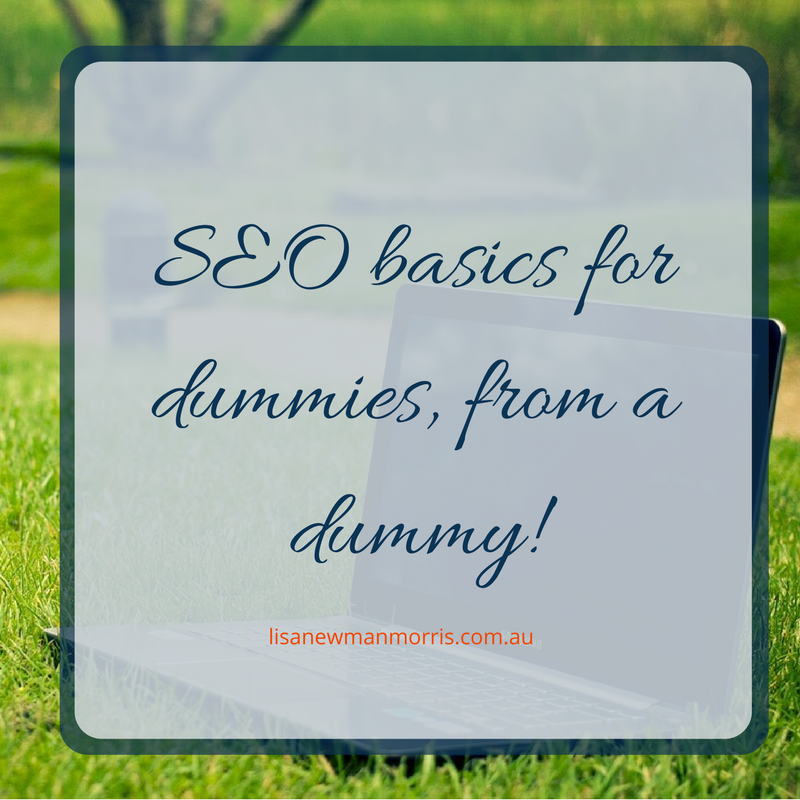SEO basics for your blog — tips from a beginner
Firstly I want to make it clear that these SEO basics for dummies are from an SEO dummy — me! I am NOT an SEO expert. I do run my own website, I built it from scratch and right now I manage my own SEO on my blog. It’s still a work in progress.
I’m definitely not claiming I know everything about SEO, but I know from my own experience, sometimes hearing a few straight forward tips from someone on your own level can be a helpful place to start. Think of my efforts today as SEO basics for dummies, from a dummy!
SEO basics for dummies, from a dummy! Share on XOver the last few months, I have learnt so much about how to improve (not master) SEO, readability and which components are important to include in a great blog post. I want to share what I’ve learnt to help you write better articles.

I’ve been blogging for several years and I currently have around 70 articles on my website. I upgraded my website to a WordPress site a few month ago. Until now, I have never invested in SEO optimisation so I am now on a mission to update every blog post, dating back several years. I have been blown away by how many little tweaks are needed to optimise my posts so that they can be more easily found by search engines.
In the interest of full disclosure, these tips are not going to be the be all and end all in winning the SEO game. There is so much more to SEO than just these tips. But these 9 tips are the main things I’ve learnt about how you can write better articles and increase your reach.
What is SEO?
What exactly is SEO? It stands for Search Engine Optimisation. There are a number of different search engines (here’s a list of the Top 10 search engines in the world) but the main one you probably know about already and no doubt you have used many times is Google.
When you are looking for information about a particular topic, you type in a Focus Keyword or phrase and Google will go to work crawling the web to find the best matches for your search query. The search results you see are a result of how well Google ranked the content it found for the keyword or phrase it was searching for. The challenge is to have your content ranking on the first page of Google for the keyword you have selected. The likelihood of being found in a Google search, if you’re not ranking on the first page, is very low.
Chances of being found in a Google search, if you're not ranking on the first page, are very low. Share on XHere are my 9 SEO basics for dummies tips to help Google find your blog articles:
1. Install Yoast
If you run a WordPress site, I recommend you install Yoast as soon as possible. Yoast is the number one SEO plugin for WordPress. Once you have it installed, simply follow the guidelines.
2. Choose a keyword
Choose a focus keyword or keywords which represent the topic you want your article to rank for. The keyword should sum up your article in a single word or short phrase. Not sure what keywords to use? You can use a tool like Google Adwords keyword planner. You want to look for keywords with a decent amount of monthly searches but with low competition, otherwise you’ll be competing against many other sites.
3. Minimum length of article
Your blog article should contain at least 300 words and ideally between 500 to 1000 words. Some of my research even suggests a minimum of 1000 words. You need to have enough content for search engines to be able to crawl the post and find what it’s looking for.
It will hard for Google to find what your article is about if there is not enough content and relevant words for it to find. So invest time into your writing and ensure you are producing great quality posts with plenty of relevant content.
4. Blog title
Choose a title for your article which also includes the focus keyword. If possible, include the keyword towards the start of the heading to help Google find it more easily. Remember it’s also important to grab the attention of your reader so they want to click to read more. Not only do you want more people reading your article but the more traffic you have, the more Google will see your article as having some authority. Basically, the more traffic you generate, the more you are likely to get.
5. Subheadings
Use subheadings throughout your post to break up the article into scannable blocks. Both Google and your readers will like it. Headings help Google grasp the main topics of a long post. Many readers will read the first paragraph or two and then scan the subsequent subheadings to see if the rest of the article is relevant to them. Great subheadings can draw them back in and keep their interest level high.
6. Content structure
The majority of your sentences should be under 20 words in length. Especially if you’re including big words or scientific jargon, a huge number of long sentences makes it harder to read. Short sentences make a point. Really they do!
Write in the second person, as if you are talking to your reader one on one. The way to do this is to use pronouns such as you, your and yours where possible.
7. Use great images
Include images in your posts which relate to your topic. Images are important to entice readers to your blog. Posts with images attract more attention on social media than those without. You mustn’t use just any image you find on the internet though. If you have the budget to do so, create your own photo library using a local photographer.
If you source images from the internet, you’ll need to pay for a licence to use stock images from sites like Shutterstock or you can grab my free printable which has 58 websites where you can source free stock imagery under a Creative Commons CCO licence.
8. Optimise your images
The images you include should reflect the topic of your post. The file name of the image is important. Use the keyword in the file name of the image and be sure to include details in the Alt Text field. Make sure your Alt Text includes the SEO keyword and relates to or describes the image.
Optimising your images is also important. Make sure your images aren’t too big or your site will be slow to load. I use WP Smush, a wordpress plugin which automatically compresses and optimises images uploaded to my site.
9. Help readers share
Give your readers something to share. By this I mean include social share icons in your post such as the ones I have below from AccessPress Social Share. You can also install a plugin to include a one click option to tweet notable quotes highlighted in your post, such as the quotes above (I use Better Click To Tweet).
Include an image or images specially optimised for Pinterest. Pinterest images should be more vertical than horizontal. According to Pinterest, the best ratio is 2:3 to 1:3.5 with a minimum width of 600px. That means dimensions of 600 x 900 to 600×2100.

Conclusion
There is a great deal to SEO than just these tips but as a fairly new beginner in the serious land of blogging, these SEO basics have been the biggest help for me in improving my blog posts. I hope they help you too.




Great article! Thanks for sharing your knowledge. I am a portrait Photographer and writing is not my forte’, but I know it’s important to blog. I will definitely implement your tips for my next blog.
I believe it’s a great way for you to show your ideal customers who you are and demostrate your knowledge so you can show them how you can help. So important Ksenia!
Great and helpful content for a new blogger like myself! Thank you for the tips!
Thanks so much Arlene. So glad to be able to help you.
Thanks for all the great info. Being a beginning blogger, its always nice when all the info is in one place instead of having to search the internet or learning on the fly after months of doing it the wrong way
Oh that’s so wonderful to hear Chelsey, I’m so wrapped to be able to offer you great solutions to help you 🙂 Come back anytime!
I never thought I would be so focused on SEO and readability. I’ve even been in the middle of a conversation and thought “Oh, no…I just said that with a passive voice” I’ve also yelled at my laptop because the red check won’t turn green!! LOL
I hear you Michelle! Those damn red and orange lights that just won’t go green!
Love this post! Answers questions I’be been avoiding asking lol
Oh I’m so pleased Zoey 🙂 You’ve made my day!
I’ve started trying to work a bit harder on my SEO lately. Back in the day I managed to fluke it but with all the or petition out there now, it’s become a bit more of an art.
Yes it sure is and one I’m still trying to learn. Of course when everyone else is competing for that top spot it makes it very tough! Thanks Chavah
Love that I found this because I was literally just doing research on this 5 minutes ago! I have the Yoast plugin on my wordpress and it has helped A TON.
I really need to focus more on my SEO, but there are sooo many things I’m trying to focus on! I wish there were 15 of me! Lol
I completely understand Nicole! If you work out a way to clone yourself, please let me know because I could do with a few more of me too 🙂
Thanks for this info! I never get tired of learning about SEO!
Thanks Robin! Me either.
Very useful article! Going to look into a few of your tips straight away (like installing yoast!). Thanks!
Oh you’ll love it Neelie! It’s fantastic. That little green light becomes a bit of an obsession though 🙂
This is a great post with lots of awesome info! Thanks for sharing this 🙂
Thanks so much Cynthia!
These tips were super helpful as I’m struggling to get readers to actually see my content, and I’m a bit of a newbie to SEO, thank you! Emily x
It’s a complicated process Emily but one step at a time 🙂
Great tips! This week my focus is on learning more of SEO and how I can help my blog perform better. Thanks for sharing
I’d love to hear how you go Victoria. There’s so much to SEO and it’s quite complicated so please check back in and tell me how you’re getting on.
This was very helpful. I love to write but I am a total novice to the blogging world. I will be uploading plugins tomorrow. Pinned.
Thanks so much Addison and all the best.
I’m a brand new blogger and haven’t figured out what SEO mean until this article. Thank you! Very informative!
So pleased to hear this Kyler, all the best with your blog!
Hi Lisa, this is excellent! I’ve saved this article for future reference.
Thanks for sharing. This is certainly going to help a lot of us optimize our blog content. 🙂
Thank you for those lovely comments Emily I really appreciate that.
Great and clear information. Thank you
Thank you Alina 🙂
This is so great! I’m definitely bookmarking this to dig into deeper soon! Thanks for sharing!!
Thanks so much Emma, I hope you find the tips helpful.
Great post and SEO tips! Thanks for sharing!
Thanks Fernando, appreciate that.
Thank you for sharing. I’m new to blogging and trying to learn all the ins and outs
Welcome to the blogging world Shari! All the best.
These are all great suggestions for upping our SEO game. I can’t believe you had to go through 7 years worth of poats to update them. Just thinking about it makes me exhausted.
haha thankyou Juvy yes it’s quite a process and I’m not done yet. Still a lot of work to do but I’ll push on! Thanks for your contribution 🙂
Super helpful, thank you for these tips! I will be sure to implement them into my blog too:)
You’re very welcome Liz, thank you so much.
Who would have thought of this? Nice article.
Thankyou Gilma
Hello Lisa,
Excellent article!!! It should be very helpful for the beginners to start a blog & improve their article.
Nice article!!! Thanks for the post.